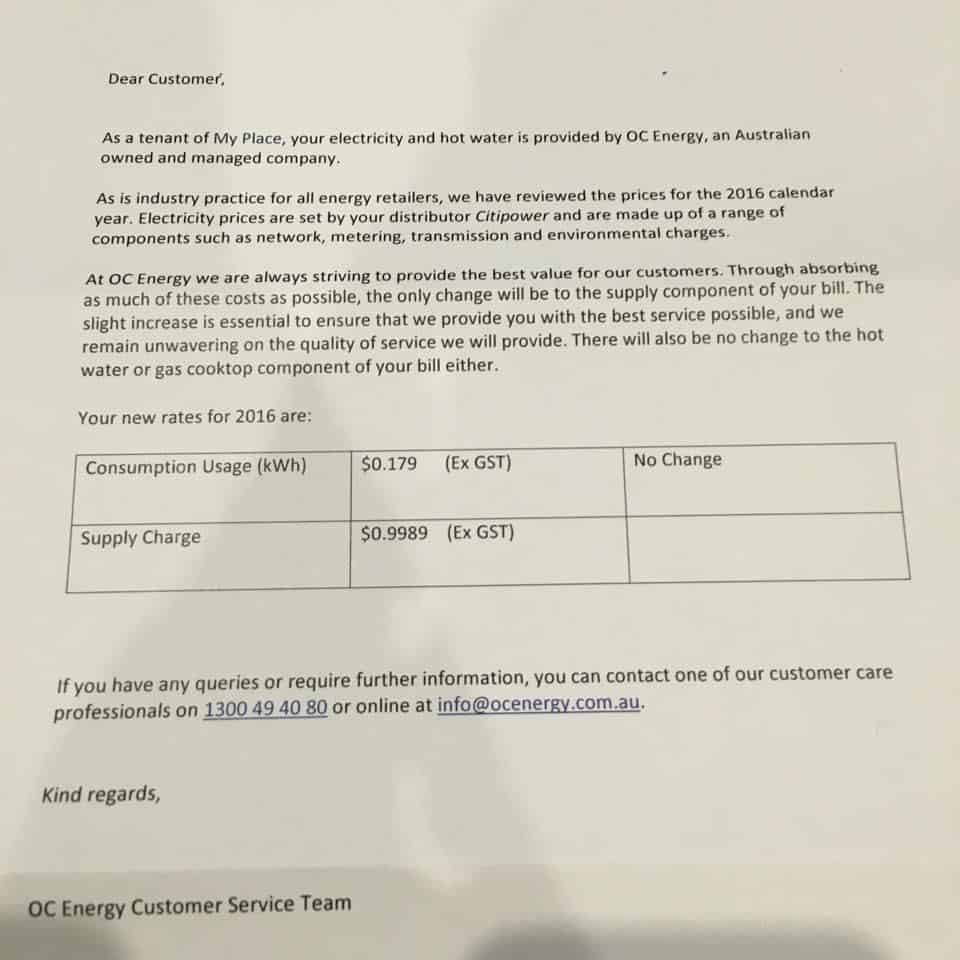MAKE SURE YOU VIEW THE VIDEO FOR THIS TEXT HERE: https://youtu.be/eH_RizXnk1g
In today’s article, I will be looking at a letter I received in my mail recently and analysing it in terms of its formality and social purpose. To give you context, this letter was sent by OC Energy, the company who supplies electricity to my apartment. Recently, they’ve increased their prices and this letter was their way of informing me about it. I thought this would be a great piece to analyse as it is littered with public language and persuasive techniques.
But first, what is public language!?
According to Don Watson, ‘public language is the language of public life: the language of political and business leaders and civil servants – official, formal, sometimes elevated language. It is the language of leaders, more than the led, the managers rather than the managed…but in every case, it is the language of power and influence. This can be seen in many modern marketing campaigns, where many companies use many lexemes that help to persuade audiences to see their viewpoint (e.g. a price increase or changing mobile numbers) – such as ‘contemporary’, ‘innovative’ and ‘forward-looking’.
Don Watson further states that ‘public language remains the language of power. It has its origins in the subjection or control of one by another’. If you’re interested, I’d recommend reading the sample of his book provided on Amazon: https://www.amazon.com/Death-Sentence-Decay-Public-Language/dp/1740512065
My general observations after my first glance, taking in account our knowledge of public language:
You’ll notice that the letter makes use of many ‘elevated lexemes‘ – that is the language of French and Latin origin. It helps to give the author and more authoritative and official tone. This can be seen in lexemes such as ‘require’, ‘queries’, ‘transmission’ etc. In everyday spoken language, we generally speak in less complex words (i.e. lexemes of Germanic origin).
OC Energy seems to end their first sentence by saying that they’re an ‘Australian owned and managed company‘ – what is the reason behind this? I can’t be definitive, but my guess is that by reinforcing their company as being Australian, perhaps customers would be more inclined to accept a price increase? Think about it. Many companies often push for an ‘Australian image’ – Aussie growers, farmers etc. It creates a sense of patriotism, which sets up a pretext for an acceptance of price increases.
You’ll notice that OC Energy doesn’t really give a genuine or understandable reason for increasing prices. They seem to deflect blame to the distributor of the power (Citipower).
You’ll notice that the author makes use of many cohesive ties, particularly the use of information flow. This can be seen in the sentence ‘through absorbing as much of these costs as possible‘, known as a front focus. Again, this helps to mitigate their price increase by saying that the energy company has ‘absorbed‘, but like the public language it is, what does that ACTUALLY mean? Where and how have they absorbed it?
This deflection of blame is shortly followed by ‘a range of components such as network, metering, transmission and environmental charges‘. If we just analyse this sentence in itself, it is littered with public language! Remember, the language of power and influence, and little substantial value.
You’ll notice that blame is further deflected by saying that a price increase is ‘industry practice for all retailers‘ – what does this actually mean? It’s very hard to give a precise definition of this phrasing of public language.
This public language continues in the final paragraph, where the author says ‘customer care professionals’ – they are simply customer service reps, so why not call it that? By labelling them as ‘customer care professionals’, it helps to remove the negative connotations associated with customer service representatives – instead, the customer’s view changes – to that of feeling valued, ‘cared’ and serviced by knowledgeable and credible employees (professionals).
GENERAL OBSERVATIONS
I noticed the use of passive sentences – very common in formal documents (syntax).
You’ll notice the use of adjectives such as ‘slight’ before the noun ‘increase’ – again to reduce the magnitude of the price increase (lexicology).
On that topic, ‘increase’ is a nominalisation – it ultimately removes blame or agency from the energy retailer! By distancing themselves from this ‘increase’ by not attributing an agent to the increase, OC Energy can help to maintain positive face needs and ultimately uphold their positive image. This can further be reflected in the lexeme ‘change’ in the sentence ‘the only change will be to the supply component of your bill’. (syntax)
For homework, I’d recommend writing an analytical commentary on this practice text with a focus on manipulation and deflection of blame. Make sure you structure it according to the analytical commentary structure provided in my online course: https://www.udemy.com/VCE-english-language-course/?couponCode=GET25OFF
About Learnmate
Learnmate is a trusted Australian community platform that connects students who want 1:1 or small group study support, with tutors who are looking to share their knowledge and earn an income. From primary school to high school subjects — from science and maths to niche subjects like visual communication — Learnmate can help you improve academic performance or boost confidence, at your pace with the tutor that you choose.
We pride ourselves in offering a reliable and positive experience for both our students and tutors. Every tutor that joins the platform is vetted to meet a level of academic excellence, teaching qualification or relevant experience. All tutors are provided the opportunity to complete professional training.
Students and parents can easily find and screen for tutors based on their location, their subject results or skill level, and whether they provide in-person or online sessions. Learnmate is proud to provide tutors in Melbourne, Sydney, Geelong, Brisbane, Hobart, Canberra, Perth & Adelaide, and other locations.




